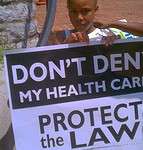 Originally posted by The Half Sheet on March 4, 2015.
Originally posted by The Half Sheet on March 4, 2015.
Quality, affordable health coverage for hundreds of thousands of Virginians is under attack yet again. Today, the Supreme Court is hearing whether people should be penalized if they live in a state — like Virginia — that has not developed its own marketplace where people can shop for private insurance. As the debate unfolds, here are some key facts to keep in mind.
Nearly 385,000 Virginians signed up for private health insurance this year through the federal marketplace, according to a report from the U.S. Department of Health & Human Services.
And about 319,000 of them, 83 percent, received tax credits to help them pay for their coverage. If the Supreme Court sides with opponents of national health reform, then these Virginians could be forced to pay more or drop their coverage altogether.
In other words, 319,000 Virginians will be penalized because of where they live if the Supreme Court buys the argument that only people who have access to a state-run marketplace can get tax credits.
The most absurd part of this situation is that Virginia lawmakers could have avoided putting their constituents at risk. If lawmakers had put their constituents’ needs ahead of partisan politics and developed a state-based marketplace in years past, this would be a non-issue. Or if they had done the prudent thing and adopted the proposed safeguards this session of the General Assembly, like the ones proposed in Senate bill 1363, the state would be in a position to protect its residents and deal with whatever comes out of the Supreme Court’s deliberations.
Instead, 319,000 Virginians will be in limbo between now and June, when the Supreme Court announces its opinion on whether to penalize people who live in states that resisted national health reform.
If the Supreme Court sides with reform opponents, the Virginians who can no longer get help affording their coverage will be in the same boat as the 195,000 other Virginians who have been in the coverage gap since January 2014, unable to benefit from the law of the land.




